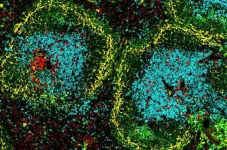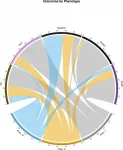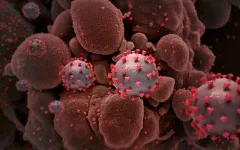(Press-News.org) A new Veterans Affairs study finds that combat experience is associated with a higher risk of alcohol use to cope with PTSD symptoms. But the connection is weaker when accounting for the severity of the PTSD.
The findings appeared online in the Journal of Dual Diagnosis in March 2021.
In an observational study of more than 11,000 men with at least one traumatic experience, the researchers found that those with combat experience were much more likely than those without to report drinking alcohol to cope with PTSD. The diversity of traumatic experiences, the severity of PTSD, and diagnoses of alcohol abuse or dependence were significantly tied to drinking to cope with PTSD.
However, combat experience was not strongly linked to drinking to cope when the researchers adjusted for a person's total number of PTSD symptoms.
The researchers write: "Our findings suggest that although men with combat experience may be more prone to use alcohol to cope with PTSD symptoms and associated distress than trauma-exposed men without military combat experience, this may be partially due to greater overall posttraumatic stress severity among men who experienced military combat.
"This interpretation is supported by higher rates of PTSD and greater PTSD symptom totals among men with [combat experience] versus those without in our sample, as well as with prior research linking PTSD severity to both combat exposure and hazardous alcohol use. Alcohol use may be perceived by military combat Veterans as an effective, socially acceptable strategy for coping with PTSD symptoms and associated distress, perhaps due to certain personality factors, masculinity-related gender norms, or general attitudes toward alcohol common in the military. These and other possible interpretations warrant additional research attention."
Dr. Shannon Blakey, a postdoctoral fellow at the Mid-Atlantic Mental Illness, Research, Education and Clinical Center at the Durham VA Health Care System in North Carolina, led the study. Dr. Jack Tsai and Dr. Eric Elbogen, both of the VA National Center on Homelessness Among Veterans, were the co-authors.
Blakey was most surprised by two of the findings.
"First, the association between combat experience and drinking to cope was statistically significant when adjusting for the presence versus absence of a PTSD diagnosis, but not when adjusting for the number of PTSD symptoms," she says. "This suggests that drinking to cope among trauma-exposed men is more strongly associated with PTSD severity than the mere presence of PTSD."
"Second, our analyses showed that trauma-exposed men without combat experience were more likely than men with combat experience to report an alcohol use disorder," she adds. "That's not entirely consistent with previous research and highlights the complexity of associations between trauma exposure, posttraumatic experiences, drinking to cope, and drinking severity among trauma survivors."
Understanding the complicated nature of PTSD is one of VA's most pressing challenges. Large percentages of Veterans who fought in Vietnam, the Gulf War, and Iraq and Afghanistan have had PTSD sometime in their lives. Symptoms include flashbacks, nightmares, hypervigilance, aggressive behavior, and anxiety.
Studies have shown that PTSD increases the risk for drinking problems. But research has been scant on whether combat experience is linked to alcohol use to cope with PTSD.
Blakey's team used data from men who took part in the National Epidemiologic Survey on Alcohol and Related Conditions. The survey recruited a nationally representative sample of U.S. adults between 2004 and 2005, including Veterans and non-Veterans.
The researchers focused mostly on the responses to the yes-no question, "Did you ever drink alcohol to improve your mood or to make yourself feel better when you were [experiencing PTSD symptoms]?" They adjusted for whether the men met the criteria for alcohol use disorder. They were thus able to capture both drinking severity and drinking to cope with PTSD symptoms in their analyses.
The survey also asked participants if they were ever in combat. Nearly 1,400 said they had combat experience, and more than 10,000 said they did not. It's possible that some in the latter group were non-combat Veterans. An analysis showed that drinking to cope with PTSD symptoms was more than twice as common among men with combat experience than those without (6.46% versus 2.37%).
Blakey says the findings raise questions that can be explored in future studies.
"Is there something unique about combat trauma, relative to other types of trauma, that increases the chances men will use substances like alcohol to ease their PTSD symptoms. Are men who experience combat more likely than men without combat experience to hold positive sociocultural beliefs about the acceptability and helpfulness of alcohol to cope with PTSD symptoms? Are men who assume combat roles at greater risk of drinking to cope due to some other pre-existing risk factor?"
Although a large sample size was a strength of Blakey's study, the research had limitations. One of them was that the participants were specifically asked about their combat experience, not about their overall military service history. Therefore, it was unknown how many of the men without combat experience were Veterans. The study also did not include women.
"Future research can hopefully compare PTSD-related alcohol use risk factors and outcomes among combat Veterans, non-combat Veterans, and non-Veterans," Blakey said. "It would also be important for future studies to recruit enough women Veterans to examine the potential influence of sex and gender on these relationships."
INFORMATION:
Aquaculture--the farming of fish, shellfish, and other aquatic animals for food--has reached unprecedented levels of growth in recent years, but largely without consideration of its impact on individual animals, finds a new analysis by a team of researchers.
"The scale of modern aquaculture is immense and still growing," says Becca Franks, a research scientist at New York University's Department of Environmental Studies and the lead author of the paper, which appears in the journal Science Advances. "Yet we know so little about the animals that we are putting into mass production, ...
ANN ARBOR--We are made of stardust, the saying goes, and a pair of studies including University of Michigan research finds that may be more true than we previously thought.
The first study, led by U-M researcher END ...
WEHI researchers have discovered a key differentiation process that provides an essential immune function in helping to control cancer and infectious diseases.
The research, published in Science Immunology, is the first to show a new factor - DC-SCRIPT - is required for the function a particular type of dendritic cell - called cDC1 - that is essential in controlling the immune response to infection.
Led by WEHI Professor Stephen Nutt, Dr Michael Chopin and Mr Shengbo Zhang, it defines the role for a new regulatory protein - DC-SCRIPT - in producing dendritic cells.
At a glance
WEHI researchers have uncovered a key step in the formation of a particular type of dendritic cell - called cDC1 - in controlling ...
WEST LAFAYETTE, Ind. -- If you walk with your spouse or partner on a regular basis, you might want to speed up. Or tell them to.
A new study by Purdue University nursing, health and kinesiology, and human development and family studies researchers shows that couples often decreased their speed when walking together. Speed further decreased if they were holding hands.
The study looked at walking times and gait speeds of 141 individuals from 72 couples. The participants ranged from age 25-79 and were in numerous settings, including clear or obstacle-filled pathways, walking together, walking together holding hands and walking individually.
"In our study, we focused on couples because partners in committed relationships often provide essential support ...
Wearing a face mask can protect yourself and others from Covid-19, but the type of material and how many fabric layers used can significantly affect exposure risk, finds a study from the Georgia Institute of Technology.
The study measured the filtration efficiency of submicron particles passing through a variety of different materials. For comparison, a human hair is about 50 microns in diameter while 1 millimeter is 1,000 microns in size.
"A submicron particle can stay in the air for hours and days, depending on the ventilation, so if you have a room that is not ventilated or poorly ventilated then these small particles can stay there for a very long period of time," said Nga Lee (Sally) Ng, associate professor and Tanner Faculty Fellow in the School of Chemical and Biomolecular Engineering ...
New research led by investigators from Boston Medical Center and Grady Memorial Hospital demonstrates the significant decline in hospitalizations for neurological emergencies during the COVID-19 pandemic. The rate of Subarachnoid hemorrhage (SAH) - bleeding in the space between the brain and the tissue covering the brain - hospitalizations declined 22.5 percent during the study period, which is consistent with the other reported decreases in emergencies such as stroke or heart attacks.
Published in Stroke & Vascular Neurology, the study compares subarachnoid hemorrhage hospital admissions for the months following throughout the initial COVID surge, in hospitals that bore ...
In a new study, researchers identify three clinical COVID-19 phenotypes, reflecting patient populations with different comorbidities, complications and clinical outcomes. The three phenotypes are described in a paper published this week in the open-access journal PLOS ONE 1st authors Elizabeth Lusczek and Nicholas Ingraham of University of Minnesota Medical School, US, and colleagues.
COVID-19 has infected more than 18 million people and led to more than 700,000 deaths around the world. Emergency department presentation varies widely, suggesting that distinct clinical phenotypes exist and, importantly, that these distinct phenotypic presentations may respond differently ...
HOUSTON - (April 2, 2021) - Understanding what drives food choices can help high-volume food service operations like universities reduce waste, according to a new study.
Researchers have concluded that food waste in places like university cafeterias is driven by how much people put on their plates, how familiar they are with what's on the menu and how much they like - or don't like - what they're served.
Food waste has been studied often in households, but not so often in institutional settings like university dining commons. What drives food choices in these "all-you-care-to-eat" facilities is different because diners don't perceive personal financial penalty if they leave food on their plates.
Published in the journal Foods, "Food Choice and Waste in University Dining Commons ...
A personalized tumor cell vaccine strategy targeting Myc oncogenes combined with checkpoint therapy creates an effective immune response that bypasses antigen selection and immune privilege, according to a pre-clinical study for neuroblastoma and melanoma. The neuroblastoma model showed a 75% cure with long-term survival, researchers at Children's National Hospital found.
Myc is a family of regulator genes and proto-oncogenes that help manage cell growth and differentiation in the body. When Myc mutates to an oncogene, it can promote cancer cell growth. The Myc oncogenes are ...
James McKerrow, MD, PhD, dean of the Skaggs School of Pharmacy and Pharmaceutical Sciences at University of California San Diego, has long studied neglected tropical diseases -- chronic and disabling parasitic infections that primarily affect poor and underserved communities in developing nations. They're called "neglected" because there is little financial incentive for pharmaceutical companies to develop therapies for them.
One of these neglected diseases is Chagas disease, the leading cause of heart failure in Latin America, which is spread by "kissing bugs" carrying the parasite Trypanosoma cruzi. These parasites produce an enzyme called cruzain that helps ...




